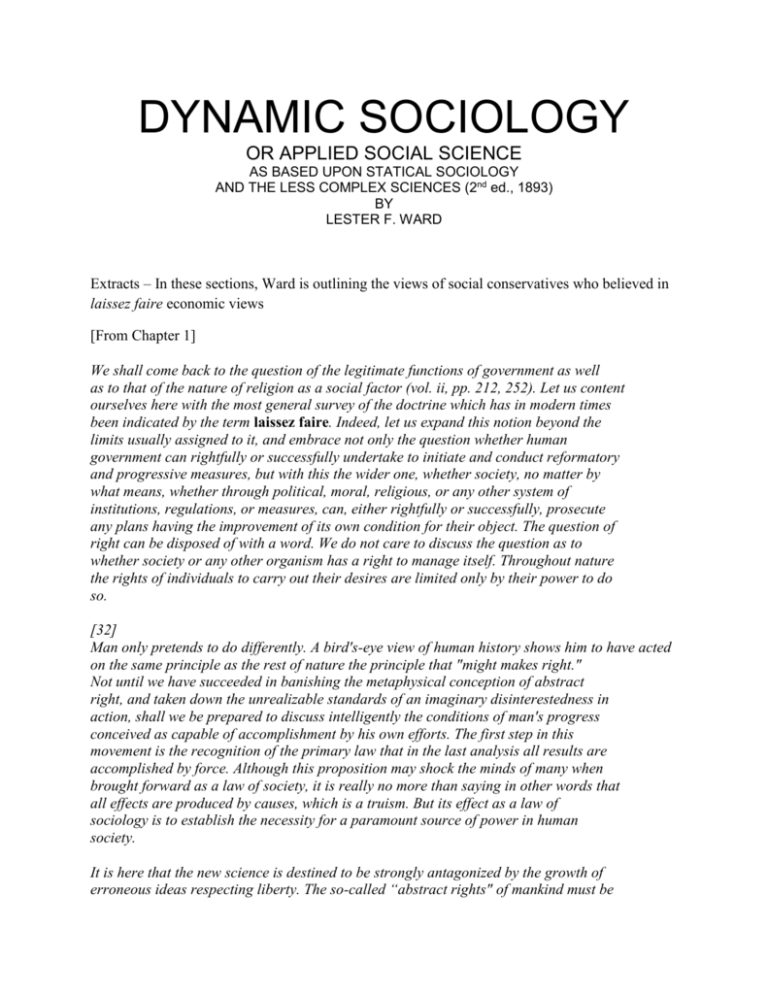DYNAMIC SOCIOLOGY OR APPLIED SOCIAL SCIENCE AS
advertisement

DYNAMIC SOCIOLOGY OR APPLIED SOCIAL SCIENCE AS BASED UPON STATICAL SOCIOLOGY AND THE LESS COMPLEX SCIENCES (2nd ed., 1893) BY LESTER F. WARD Extracts – In these sections, Ward is outlining the views of social conservatives who believed in laissez faire economic views [From Chapter 1] We shall come back to the question of the legitimate functions of government as well as to that of the nature of religion as a social factor (vol. ii, pp. 212, 252). Let us content ourselves here with the most general survey of the doctrine which has in modern times been indicated by the term laissez faire. Indeed, let us expand this notion beyond the limits usually assigned to it, and embrace not only the question whether human government can rightfully or successfully undertake to initiate and conduct reformatory and progressive measures, but with this the wider one, whether society, no matter by what means, whether through political, moral, religious, or any other system of institutions, regulations, or measures, can, either rightfully or successfully, prosecute any plans having the improvement of its own condition for their object. The question of right can be disposed of with a word. We do not care to discuss the question as to whether society or any other organism has a right to manage itself. Throughout nature the rights of individuals to carry out their desires are limited only by their power to do so. [32] Man only pretends to do differently. A bird's-eye view of human history shows him to have acted on the same principle as the rest of nature the principle that "might makes right." Not until we have succeeded in banishing the metaphysical conception of abstract right, and taken down the unrealizable standards of an imaginary disinterestedness in action, shall we be prepared to discuss intelligently the conditions of man's progress conceived as capable of accomplishment by his own efforts. The first step in this movement is the recognition of the primary law that in the last analysis all results are accomplished by force. Although this proposition may shock the minds of many when brought forward as a law of society, it is really no more than saying in other words that all effects are produced by causes, which is a truism. But its effect as a law of sociology is to establish the necessity for a paramount source of power in human society. It is here that the new science is destined to be strongly antagonized by the growth of erroneous ideas respecting liberty. The so-called “abstract rights" of mankind must be denied if society is ever to become the arbiter of its own destiny - in theory, that is, for it is impossible that the real enjoyment of liberty should be thereby in the least diminished, while the sum of human happiness must be greatly increased, and this is the only conceivable object of any right. All the prevailing theories of human rights are but ideal conceptions which not only have never yet been realized, but in the nature of things never can be. In point of fact, all things are now and always have been governed by force, and all the attempts to disguise it under the color of abstract right have only served to make it easier for the unscrupulous to accomplish their personal aggrandizement. Government has always wielded an iron scepter, which the forms of law have only rendered the more inexorable. The most complete recognition of the right of force in human _____ [33] society - the only rule known to the rest of the sentient world, and the only one ever acted upon by mankind - could by no possibility render matters, worse than they are. But this recognition would put it in the power of the controlling authorities in society to introduce progressive elements into government, and make the coercion which is now so fruitless a positive and increasing future benefit. Under the negative system of government which has prevailed thus far, the world naturally looks round and asks what return it has received in exchange for all this sacrifice, and it is no wonder that many insist that the account is against government, and would gladly dissolve the partnership and annul the "social compact." The remainder of the problem can only be profitably discussed in the abstract. For there is, on the one hand, nothing in the experience of the past to teach us the possibility of the ultimate success of teleological measures, while, on the other hand, the short-sighted and profoundly mistaken character of nearly all such measures as have thus far been tried renders them wholly useless as signals either to follow or to shun. [NOTE: TELEOLOGY is the philosophical school of thought that is based on the belief that all things in existence are designed for a specific result, that there is an inherent purpose or final cause for all that exists in the universe. Established by Greek philosophers it has been developed by theologians, historians, and ethicists to argue that humans are part of a design. Ward had doubts that “natural rights” were anything but a human invention.] …… 508 GENESIS OF CIVIL JUSTICE. We are now prepared to consider the question, How far has natural justice, or the "right of might," been modified by the transition to civil justice? How much of what we term loyalty and respect for the rights of others can be attributed to sentiment - to a subjective force - and how much must find its explanation in circumstances, or an objective force? How law-abiding would men be of their own accord? Involved in these questions is the paradox that, while society virtually denies the sufficiency of sentiment and moral character by refusing to abolish its prohibitory laws, it at the same time vehemently affirms such a sufficiency as often as it is questioned. The greater part of this difficulty is sought to be avoided by the claim that society is divided into two classes, one of which does, and the other does not, require the maintenance of these laws whether social or civil. Admitting the truth of this statement, the question is narrowed down to determining the line of demarkation between these classes, between the loyal and the lawless, between those who recognize and accept the human or artificial code, and those who were the penalties removed, would revert to the natural code. [509] This lays bare a second paradox, for, while almost any one would say that this boundary lies somewhere between the higher and the lower classes, and while all laws are made especially severe against the low and ignorant, still, the same persons who say this and the men who make these laws might deny, if asked the question, that intelligence or education exerts any influence on morals (supra, p. 134, note). An attempt has already been made to solve this perplexity by showing that, although intelligence, consisting as it must of intellectual elevation coupled with the possession of real knowledge, does unquestionably strengthen and promote all the virtues that make up a high moral character, that it does so in proportion to its degree, and that this is the only possible means of securing this object; yet, as actions are the result of the forces in operation within and without, and as these forces, which are the desires, may be disproportionately and abnormally strengthened under peculiar circumstances, it therefore often happens that increased intelligence which really exalts the character, affords a keener appreciation of justice, and intensifies the desire to see it done, increases, at the same time and under the peculiar and unequal circumstances of those involved, the desire to possess what is only obtainable by manifest injustice, by furnishing easy means of thus obtaining it. If the circumstances be such that the latter desire predominates over the former, action follows of necessity, and the injustice is clearly chargeable to intelligence. In other words, knowledge increases the temptations to act unjustly at the same time that it increases the desire to act justly, and which one of these is to prevail must depend upon circumstances. It must necessarily follow that, wherever intelligence works evil, it is due to inequality of opportunity to acquire knowledge; and this constitutes a powerful argument for impartial education (vol. ii, pp. 535, 596, 607). The line of demarkation which we are seeking must therefore lie between that class of persons whose knowledge has elevated them above the temptations to [510] which they happen to be subject, and that class whose temptations are too strong for their character. It must, therefore, depend upon two different elements - intelligence and circumstances - and vary as these two forces vary. But what I desire particularly to bring into view is the error of supposing that the condition of character which renders a man incapable of larceny or robbery takes him out of the class who obey the natural rather than the human code. Not all of those who appear to have risen above this natural law have really done so. The moral progress of the world is more apparent than real, especially as regards respect for proprietary rights. This is evidenced in a thousand ways. In fact, it must be assumed as a basis for all legislation and a postulate for every human transaction that men will pursue the course which secures to them the greatest gain. Not gain in its widest sense, as the greatest amount of happiness, but pecuniary or possessory gain. Moral considerations cannot be trusted. Moral obligations are voidable at law. Supreme selfishness is presumed in all business transactions. And it is reasonably presumed, to depend upon anything else is to build upon the sand. Ward believed that religion and philosophy had been used to justify governments that could not redistribute property and effectively deal with such issues as poverty, educations, etc. In is view, the emerging discipline and profession of sociology could be used to plan a better social system, that government could erase inequality, end poverty and make society a planned ‘mechanism’ that would treat all people equally. Ward’s critics charged that he was arguing for a form of "soft Marxism". Ward, however, wrote that socialism's plan to use government to own all means of production would likely fail – those who govern were human as well and would be only too happy to use power for their own selfish purposes. Ward, being a pragmatist, thought all social programs should be “fluid” and altered with circumstances. Ward’s ideas impressed many important men – Woodrow Wilson and Franklin Roosevelt knew of his work and employed some of his ideas in their legislative initiatives. Lyndon Johnson was in turn influenced by Wilson and Roosevelt when he pushed his “Great Society” legislation through Congress.






